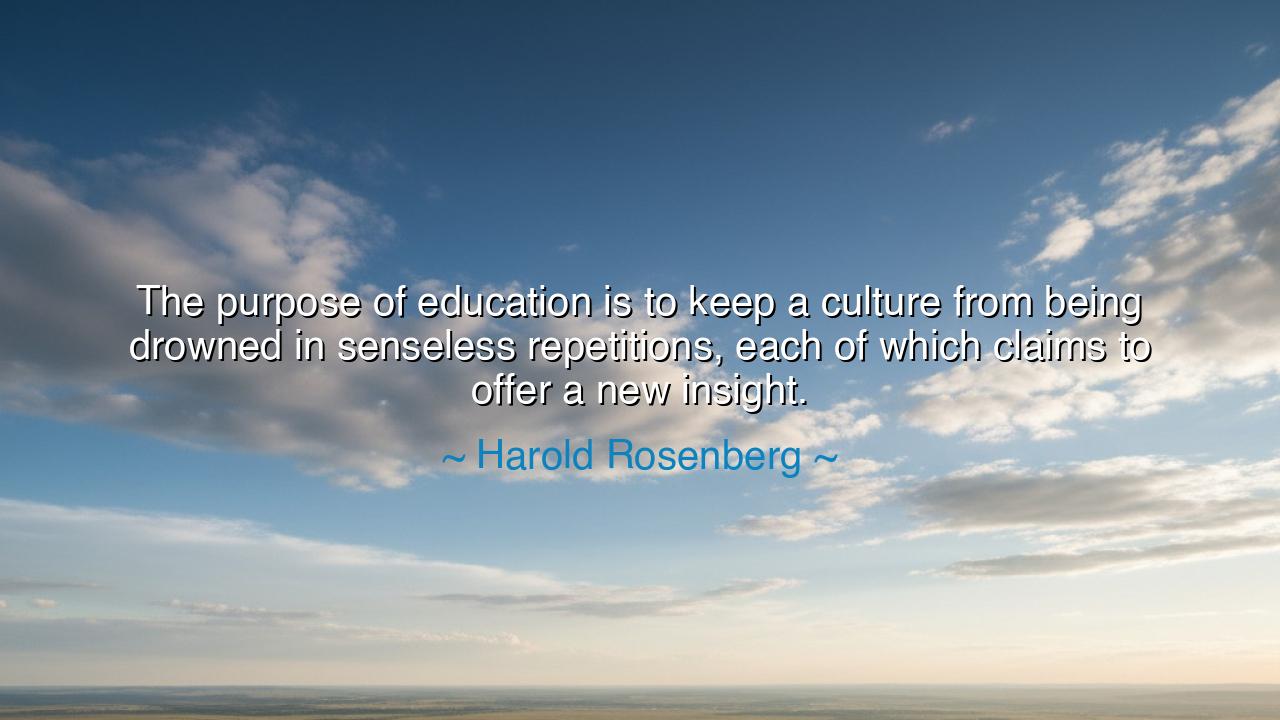
The purpose of education is to keep a culture from being drowned
The purpose of education is to keep a culture from being drowned in senseless repetitions, each of which claims to offer a new insight.






The art critic and philosopher Harold Rosenberg, one of the sharpest voices of the twentieth century, once declared: “The purpose of education is to keep a culture from being drowned in senseless repetitions, each of which claims to offer a new insight.” In this statement, Rosenberg speaks as a guardian of civilization’s memory, warning that without education, societies lose the ability to distinguish between what is truly new and what is merely the old disguised in novelty. His words echo through time like the toll of a great bell: reminding us that education is not the endless cycle of rediscovering what we have forgotten, but the disciplined cultivation of wisdom that allows us to rise above the illusions of each age.
To understand his meaning, we must first grasp what he calls “senseless repetitions.” These are the habits of thought, the empty fashions, the constant reinventions of ignorance that appear in every generation when people forget their intellectual inheritance. Without the grounding of education, every society begins again at the beginning, mistaking its own forgetfulness for originality. Rosenberg, who lived through an era of artistic revolutions and ideological turmoil, saw that many who cried “innovation” were merely echoing the errors of the past. Thus, he taught that education is the great anchor of culture — the force that keeps humanity from drifting endlessly in circles, forever mistaking noise for truth.
This wisdom was known to the ancients. The philosopher Plato, in his Republic, warned that without true education, society becomes captive to the passions of the moment. Fads replace philosophy; rhetoric replaces reason. Each generation imagines itself enlightened, while unknowingly repeating the blindness of its ancestors. To be educated, then, is not to worship the past, but to remember it — to carry forward its lessons, to refine them, and to build upon them rather than erase them. Rosenberg’s insight is thus an echo of that eternal law: that a culture survives not by forgetting, but by learning.
History itself is filled with warnings of what happens when societies abandon that principle. Consider the fall of Rome, once the world’s greatest empire. When the Romans ceased to value learning — when the libraries were left to dust and rhetoric replaced philosophy — the empire decayed from within. The Dark Ages that followed were not dark because the stars disappeared, but because education did. Knowledge was scattered, wisdom forgotten, and the cycle of ignorance began anew. Only when learning was reborn in monasteries and universities did the flame of civilization reignite. Rosenberg, like the monks of that age, calls upon us to protect that flame — to ensure that we do not drown again in the darkness of our own amnesia.
But Rosenberg’s words also contain a modern warning. In an age of endless information, where every voice declares itself wise, the danger of senseless repetition grows ever greater. Ideas circulate like mirrors reflecting mirrors — loud, bright, and hollow. Without the discipline of education, the mind becomes unable to tell the difference between insight and imitation, between wisdom and noise. True education trains the spirit to recognize what endures, to see through illusion, and to discern truth amid chaos. It is not the accumulation of facts, but the cultivation of judgment — the art of seeing what others cannot.
We may look to Socrates as the model of this education. He taught not through lectures, but through questions — stripping away the false insights that men clung to. His mission was to expose the emptiness of repetition, to awaken minds to original thought. For Socrates, as for Rosenberg, the greatest danger was not ignorance itself, but the illusion of knowledge — the arrogant belief that one has discovered something new, when in truth one has merely repeated an old folly. Education, therefore, is not a matter of invention, but of awakening: the remembering of what is real and eternal within the human soul.
From Rosenberg’s insight, a great lesson emerges: education is the conscience of culture. It guards against self-deception. It prevents the human spirit from being swept away by the fashions of the day. The truly educated mind does not chase every new theory that promises enlightenment; it tests each one against the hard-won truths of history, ethics, and reason. It respects the wisdom of those who came before, even as it strives to transcend it.
Let us then take these words to heart. In a world intoxicated with novelty, let us remember that not all that is new is true, and not all that is old is dead. The purpose of education is not to fill minds, but to awaken discernment — to form individuals who can think deeply, remember rightly, and act wisely. Let every school, every teacher, every parent understand this sacred charge: to preserve knowledge, to refine it, and to pass it on so that humanity may rise, not repeat. For if we fail in this, we will drown — not in ignorance, but in senseless repetitions, mistaking the echo of our own confusion for the voice of wisdom.






AAdministratorAdministrator
Welcome, honored guests. Please leave a comment, we will respond soon